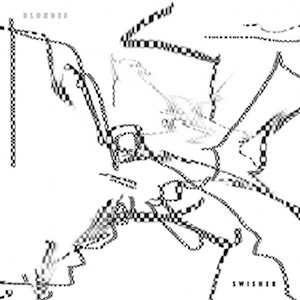Blondes Swisher
Swisher, the second full-length from Brooklyn duo Blondes (a.k.a. Sam Haar and Zach Steinman), isn’t […]

Swisher, the second full-length from Brooklyn duo Blondes (a.k.a. Sam Haar and Zach Steinman), isn’t very different from the group’s first album—and that’s a good thing. Much like on Blondes, the tracks on the new LP unfurl slowly, allowing warm bass tones and glimmering synth melodies to rise spontaneously. “Andrew” would be at home on the pair’s debut effort, not only because the producers seem to have used similar sounds to craft it, but because the sky-high melodies and deep beats stir up a familiar sense of psychedelic wonder. While neither album spans multiple genres, Blondes’ focused vision doesn’t make the duo boring or derivative. Rather, Swisher finds Haar and Steinman honing their specific voice, which draws sprawling, smooth house grooves out of wandering hardware jam sessions.
Some may complain that Blondes hasn’t radically expanded its horizons on Swisher, but frankly, such an effort isn’t even necessary, as there’s still fresh ground to cover within the confines of the duo’s engrossing signature style. This time around, Blondes’ long, winding, and pristine tracks have been imbued with a melancholy energy. While the last LP balanced dark moods by pairing each single with a lighter counterpart, this one skews toward rumbling bass tones and noisy, buzzing instrumental bursts. “Bora Bora” is probably Blondes’ heaviest production to date; it opens with an unsettling swamp of sounds and eventually coalesces around a dense kick drum that drives the track into waves of grating feedback. Likewise, metallic drum hits and surges of buzzing noise on “Wire” add a slightly industrial edge to the track’s dramatic atmosphere. Even the beatless album opener, “Aeon,” feels more theatrical and foreboding than Blondes’ shinier previous efforts, like “Lover.”
Swisher has blissful moments as well. The last track, “Elise,” starts small, with a few miniscule rattling sounds and a stomping kick, but warm chords slowly rise into the mix. Eventually, rounded bass tones mingle with a twanging, light-hearted melody. Most of the other tracks rely on flickering percussion and booming kick drums, but the crisp claps on “Elise” make for the snappiest rhythm on the album. It’s a cleansing follow-up to the menacing and tightly wound melodies that populate tracks like “Swisher” and “Poland.” It’s a prime example of how Blondes doesn’t need to revolutionize its sound in order to make a highly engaging album—simply pushing its style deeper into new directions works wonders.

